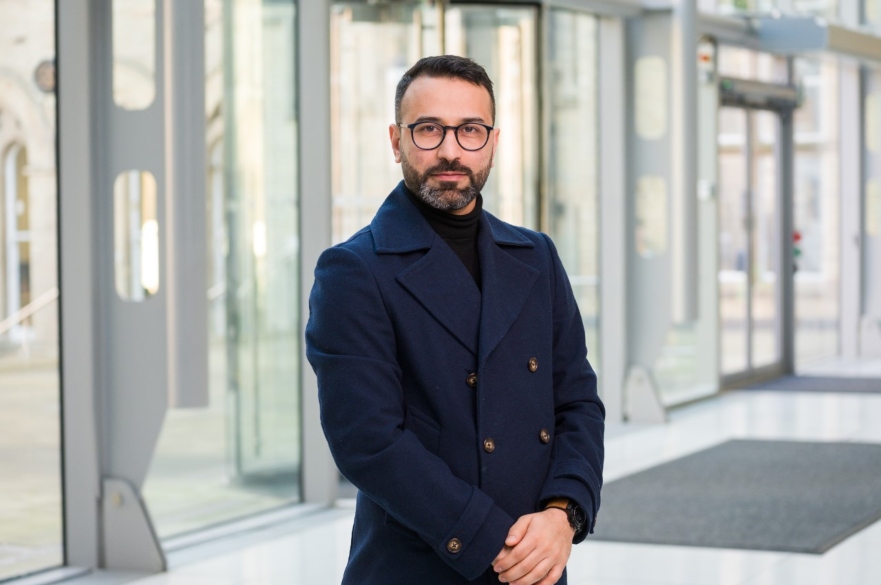Clarity on daily life applications of cryptocurrency key to attracting and retaining users
Cryptocurrency providers need to be clearer on how their digital coins can help people in their daily lives to attract and retain users, according to research by Nottingham Business School (NBS), part of Nottingham Trent University, which explores how people use cryptocurrencies.
By Helen Breese | Published on 1 November 2023
Categories: Press office; Research; Nottingham Business School;

The study by the Centre for Finance, Technology and Society at NBS collected data from 480 potential and actual users to understand what makes people see cryptocurrencies as useful and how they decide to use them. The research focused on perceived volatility, information privacy risk, anonymity, value benefits, and financial risk tolerance.
Findings revealed that people are also more likely to invest in and continue using cryptocurrencies when they see value in them, demonstrating the importance of clear communication by cryptocurrency providers about the practical benefits of their digital coins.
As part of this, users would benefit from a better understanding of how cryptocurrencies can address specific real-world problems. Providing clear and transparent information about the practical applications and benefits of blockchain technology can help users see the relevance of cryptocurrencies in their daily lives.
The most significant areas of worry for people thinking about using cryptocurrencies were found to be volatility and financial risk. Uncertainty about cryptocurrency prices and an individual’s comfort level with taking financial risks are major factors for potential users, suggesting that cryptocurrency providers need to address these concerns and offer strategies to mitigate risk.

Dr Milad Armani Dehghani, Nottingham Business School
The research also suggests that cryptocurrency providers should prioritise security and communicate their efforts to protect users' assets, as security and transparency were also seen as key aspects, withusers valuing clear and transparent information about security measures.
Collaborations with well-established companies were seen to enhance trust in a cryptocurrency, with partnerships providing a sense of security and credibility to potential users, making them more inclined to invest in and use the cryptocurrency.
Dr Milad Armani Dehghani, Senior Research Fellow in FinTech at the Centre for Finance, Technology, and Society, said: “It's not easy to find out how cryptocurrencies work compared to regular financial products. Currently people must do a lot of research into each type of digital coin to know what it can do, while at the same time seeing the rollercoaster of prices going up and down.
“There are many potential users and investors who aren’t tech experts that would be interested in cryptocurrencies if they can be made more accessible. We saw that a key issue was nervousness around market stability. If providers can stop the value of crypto jumping around through interventions such as making transactions fast, acceptance among various online retailers especially across different time zones, and cheap– like Memecoin, for example Dogecoin - or by making cryptocurrencies that stay steady in value like stablecoins, but with a more reward-oriented approach such payback coins, it would really help regular users.
“Appealing to generation Z through gamification and products like NFTs also makes it easier for people to trade and own assets without worrying about negative consequences. Making it easy to use on phones from UX concept is also key, especially for younger people who love trying new tech.”
The research also noted that even though cryptocurrencies are known for being private, many people preferred to use regular payment systems linked to cryptocurrencies, especially newcomers who preferred new kinds of crypto like NFTs which connect to regular ways of using money, making them more comfortable to use. This suggests that it would be helpful to connect cryptocurrencies to the usual ways people pay for things.
Dr Dehghani added: “Our research is important for people dealing with cryptocurrencies to understand how potential users and people who already use cryptocurrencies see them. This understanding can help them market cryptocurrencies better.”
Read the full paper Bridging the Adoption Gap for Cryptocurrencies: Understanding the Affordances that Impact Approach–Avoidance Behavior for Potential Users and Continuation Usage for Actual Users published in the journal of Information Technology & People (emerald publishing) online: https://www.emerald.com/insight/content/doi/10.1108/ITP-10-2022-0821/full/html
Notes for Editors
Press enquiries please contact Helen Breese, Public Relations Manager, on telephone +44 (0)115 848 8751, or via email.
About Nottingham Business School at Nottingham Trent University
Nottingham Business School (NBS) at Nottingham Trent University (NTU) is a leader in experiential learning and personalisation of business, management and economics education and research, combining academic excellence with positive impact on people, business and society. NBS has an unrivalled level of engagement with business, public and voluntary organisations. With more than 8,500 students, NBS is also one of UK’s largest business schools.
NBS is Quadruple+ Accredited by EQUIS, AACSB, EFMD BA for International Business, which are globally recognised hallmarks of excellence and quality for business education. NBS is also accredited by Small Business Charter, providing support and development for SMEs. The school is also a PRME Champion and held up as an exemplar and beacon by the United Nations Principles of Responsible Management Education (PRME).
About Nottingham Trent University
Nottingham Trent University (NTU) received the Queen’s Anniversary Prize for Higher and Further Education in 2021 for cultural heritage science research. It is the second time that NTU has been bestowed the honour of receiving a Queen’s Anniversary Prize for its research, the first being in 2015 for leading-edge research on the safety and security of global citizens.
The Research Excellence Framework (2021) classed 83% of NTU’s research activity as either world-leading or internationally excellent. 86% of NTU’s research impact was assessed to be either world-leading or internationally excellent.
NTU was awarded The Times and The Sunday Times Modern University of the Year 2023 and ranked University of the Year in the Whatuni Student Choice Awards 2023. It was awarded Outstanding Support for Students 2020 (Times Higher Education Awards), University of the Year 2019 (Guardian University Awards, UK Social Mobility Awards), Modern University of the Year 2018 (Times and Sunday Times Good University Guide) and University of the Year 2017 (Times Higher Education Awards).
NTU is the 5th largest UK institution by student numbers, with approximately 40,000 students and more than 4,400 staff located across five campuses. It has an international student population of 7,000 and an NTU community representing over 160 countries.
Since 2000, NTU has invested £570 million in tools, technology, buildings and facilities.
NTU is in the UK’s top 10 for number of applications and ranked first for accepted offers (2021 UCAS UG acceptance data). It is also among the UK’s top five recruiters of students from disadvantaged backgrounds and was the first UK university to sign the Social Mobility Pledge.
NTU is ranked the second most sustainable university in the world in the 2022 UI Green Metric University World Rankings (out of more than 900 participating universities).